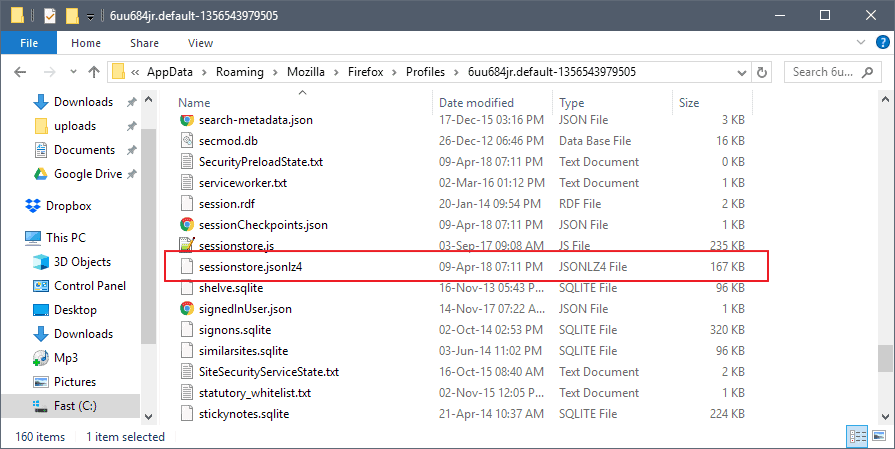
- #Firefox restore from sessionrestore file how to
- #Firefox restore from sessionrestore file install
- #Firefox restore from sessionrestore file windows
Can we use FastBack data to speed up undo close tab/window?. Implement user saving/loading of sessions. See the Discussion page for more ideas about this. An open question is to whether this should be encrypted in some manner. The data is stored on disk as a serialized javascript data structure (though it's possible that it will be converted to JSON once that becomes natively supported by Gecko/Spidermonkey). The saved session data is also cleared upon receiving the "browser:purge-session-history" notification. The user has chosen to always resume sessions. #Firefox restore from sessionrestore file install
A forced restart, such as extension install or application update. The API details and discussion are at SessionRestoreAPI.Ĭurrently, the saved session data is cleared at shutdown, except in scenarios where the feature has been directed to intentionally save it, which are: This is currently a feature of the SessionSaver extension that doesn't really fit into the core browser. An extension could store session info on a remote server, and allow users to restore the same session from multiple computers. The API should allow session information to be easily accessed by extensions. Scroll position within each scrollable area in each window. Width, height, and position of each window. Data location: File sessionstore.js in profile directory, backup in sessionstore.bak. #Firefox restore from sessionrestore file windows
It registers for events such as windows and tab open/close, collects the current state of the browser, and periodically writes that state to disk. The feature is implemented as an XPCOM service. (Note: Firefox exposes this preference in the Startup section of the Main pane of the Options/Preferences dialog.)
(int) - What is displayed when Browser starts: 0 = blank page 1 = homepage 3 = previous session. This is used for restarting the browser after application updates and extension installation. _session_once (bool) - Resume session at the next application start, but not again. _from_crash (bool) - Resume sessions post-crash. So the user is asked after the second crash which pages he wants to restore. _resumed_crashes (integer) - Number of crashes that can occur before the about:sessionrestore page is displayed. (integer) - minimal interval between saving operations in milliseconds. 
Valid for Firefox 2 and 3, superseded since Version 3.5. May not appear in about:config until changed. See the source for currently available settings and their default values. The default settings will restore the session after a crash and previous history will be restored to a certain point.
Prompt for restore upon application start, post-crash. Allow the user to "undo" closing a tab or window (P2). If post-crash, allow the user to choose whether to restore (P1). Automatically restore the session data upon restarting from a forced closure (P1). The API will provide a stable and intuitive base which power-user oriented extensions, or expanded features in future releases, can build upon. This minimal implementation provides an unobtrusive user-experience while meeting the broadest use-cases. The feature will be passive, reacting only to forced-restarts such as extension installation and crashes. The state of various window, tab and user-data will be saved, and reloaded upon application start. Let me know if any improvements can be done.After a forced restart, restore the user's workspace exactly as it was. I used a key-binding to call this script. Rm "$SESSIONS"/"$opt3" > /dev/null & notify-send -t 1000 -i $fireicon group "Session deleted" & exit 0 Opt3=$(echo "$subs"|dmenu -fn 'Droid Sans Mono-15' -i -p "Name it to delete") Opt2=$(echo "$subs"|dmenu -fn 'Droid Sans Mono-20' -i -p "Name it to open")Ĭp $SESSIONS/$opt2 $PROFILE/sessionstore.jsonlz4 > /dev/null Opt1=$(echo "$subs"|dmenu -fn 'Droid Sans Mono-20' -i -p "Name it to create")Ĭp $PROFILE/sessionstore-backups/recovery.jsonlz4 $SESSIONS/$opt1 > /dev/null & notify-send -t 1000 -i $fireicon Firefox "Session created" & exit 0 (! pidof firefox > /dev/null ) & notify-send -t 1000 -i $fireicon Firefox "Firefox is not running" & exit 1 Opt=$(echo -e "Create\nOpen\nDelete"| dmenu -fn "Droid Sans Mono-20" -i -p "firefox session:") ] & mkdir -p $SESSIONSįireicon=/usr/share/icons/Paper/512x512/apps/firefox.png 
] & notify-send Firefox "Profile was not found" & exit 0 PROFILE="$HOME/.mozilla/firefox/.default/" I wrote a dmenu wrapper bash script that copies that copies the file recovery.jsonlz4 itself to some location with a given name and restores when asked for.


#Firefox restore from sessionrestore file how to
Arkadiusz's answer was very good, but the problem was that the recovery.jsonlz4 file contained so much of data about which I was not sure how to process.








 0 kommentar(er)
0 kommentar(er)
